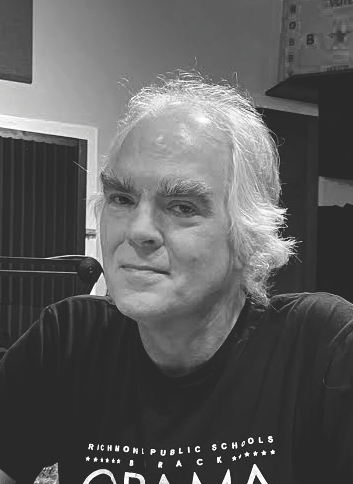Carl Hamm explores the “Pop Yeh-Yeh” sounds of Malaysia and beyond.

Hamm with Pop Yeh-Yeh musicians A. Rahman Hassan (left) and Adnan Othman during a 2014 trip to Malaysia.
Contributed photo
The best disc jockeys can draw you into their special world of sound. Richmond native Carl Hamm, aka DJ Carlito, takes it a step further—exploring music across the globe, and particularly the popular music of Southeast Asia, by documenting its untold stories and unsung heroes.
“Music breaks down all barriers,” says the 40-year-old. “It can be a common thing that we can share no matter where we are from.”
Hamm is the host of If Music Could Talk, a Sunday night radio show on Richmond’s WRIR that explores diverse world music. He has also been responsible for a series of popular Central Virginia DJ events (and wedding ceremonies) themed around “Bollywood,” the vibrant and outsized tunes heard in the film musicals of India.
But for the past few years, Hamm, who works at the University of Richmond law school during the day, has turned his attention to the music of Malaysia and Singapore, and in particular the 1960s scene that birthed a genre now called “Pop Yeh-Yeh.” His efforts have resulted in two critically-acclaimed CD box sets on the Seattle-based Sublime Frequencies label, Pop Yeh-Yeh: Psychedelic Rock from Singapore and Malaysia: 1964-1970 Vol. 1 and Bershukor: A Retrospective of Hits by a Malaysian Pop Yeh-Yeh Legend (Adnan Othman). These rich musical anthologies come complete with book-thick liner notes, tracing how the sounds of Cliff Richard and the Shadows, the Beatles (whose “She Loves You” refrain of “Yeah, Yeah, Yeah” spurred the genre’s name) and other British groups helped to influence the music of these former English colonies, making for a unique sonic melding of cultures. More importantly, he has made the songs (many never released in America) easily accessible for the first time.
“Being interested in Bollywood, I can tell you that there’s a plethora of info on what Bollywood is all about,” says Hamm. “But Malaysia, we don’t know much about this culture at all.”
Hamm, a graduate of James Madison University, grew up in a home dominated by art. His mother, Monica Rumsey, worked for years as an editor at the Virginia Museum of Fine Arts and his father Glenn Hamm, who died from Lou Gehrig’s Disease when Carl was three, was a painting and art fundamentals instructor at Virginia Commonwealth University who left behind a treasure trove of books, music and art. Later in life, the youngster would pour over the material and organize his late father’s collection. “That’s where I trace my interest in being an archivist, finding out more about my dad through his stuff. It helped me to understand that if people don’t save and share their precious history, it can be lost forever.”
After graduating, Hamm moved to New York City, where he says he “immersed himself in other cultures,” spending quality time in bodegas and African markets learning about foreign customs and encountering exotic music. After the 9/11 terrorist attacks, work became scarce and he moved back home to Richmond, where he says he found “a hipper, more cosmopolitan place than when I left.” WRIR, a freeform music station with a wide-ear format, had gone on the air and so he started his radio program.
In 2005, he chanced upon some images of Malaysian rock albums from the 1960s and became transfixed. “The LP covers were colorful, rich, vibrant … everyone was so young and happy. I thought, ‘Who are these people? What is this place?’”
There wasn’t much concrete data to go on, so Hamm began doing his own research, plugging into chat rooms where fans exchanged information. His 2010 Kickstarter-funded campaign to visit Malaysia and interview surviving musicians—including bands that still perform today in the original style—resulted in more than 40 hours of footage, which he hopes to edit into a definitive documentary on Pop Yeh-Yeh. His efforts have been much appreciated, he says. “The musicians there were all really excited that this American guy was going over just to find them and meet them and tell their stories.” Moreover, he funnels all of the money made from his efforts back to the original players through a “Pop Yeh-Yeh Welfare Club” set up by bandleader A. Rahman Hassan. “It’s a group that meets once or twice a year, and the money helps to pay for events that they put on.”
Fifty years after this music was made—and soon went out of fashion as soul and disco took over—there is a Pop Yeh-Yeh revival going on that Hamm saw firsthand. “Even current Malaysian bands are echoing the music. Pop Yeh-Yeh was a flash in the pan, but it’s the golden period of Malaysian music in many people’s minds.” SublimeFrequencies.com










